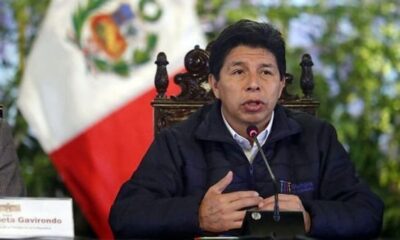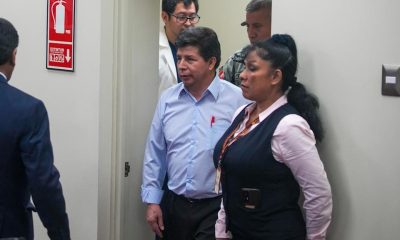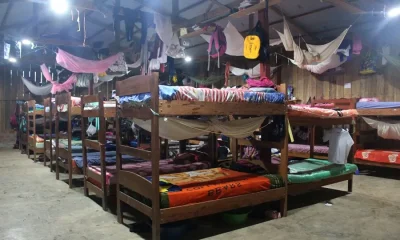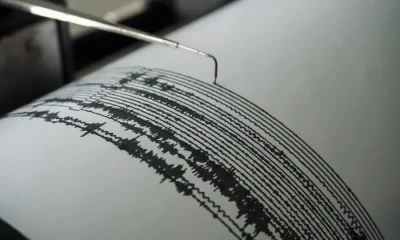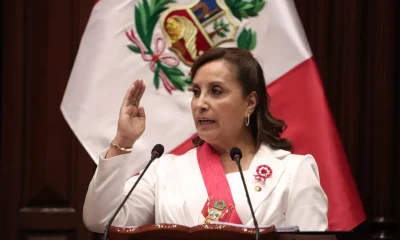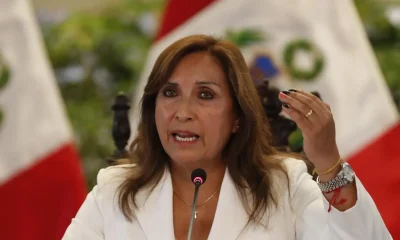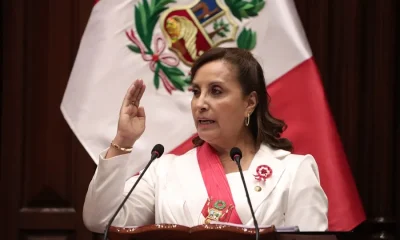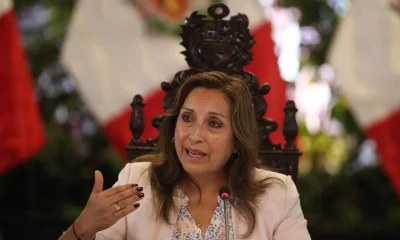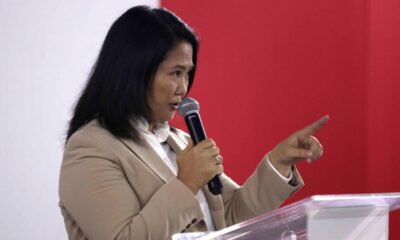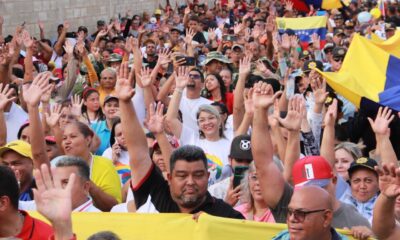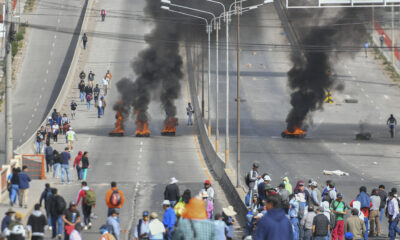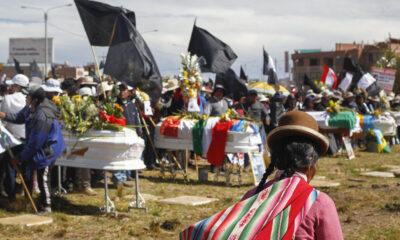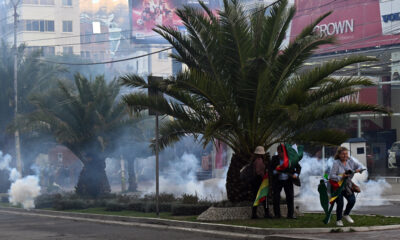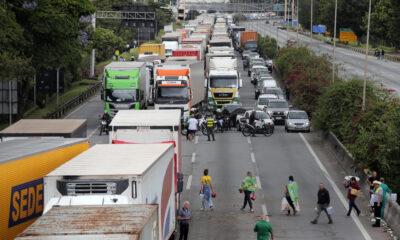International
EU concerned about Peru protesters ‘killed’, urges calm
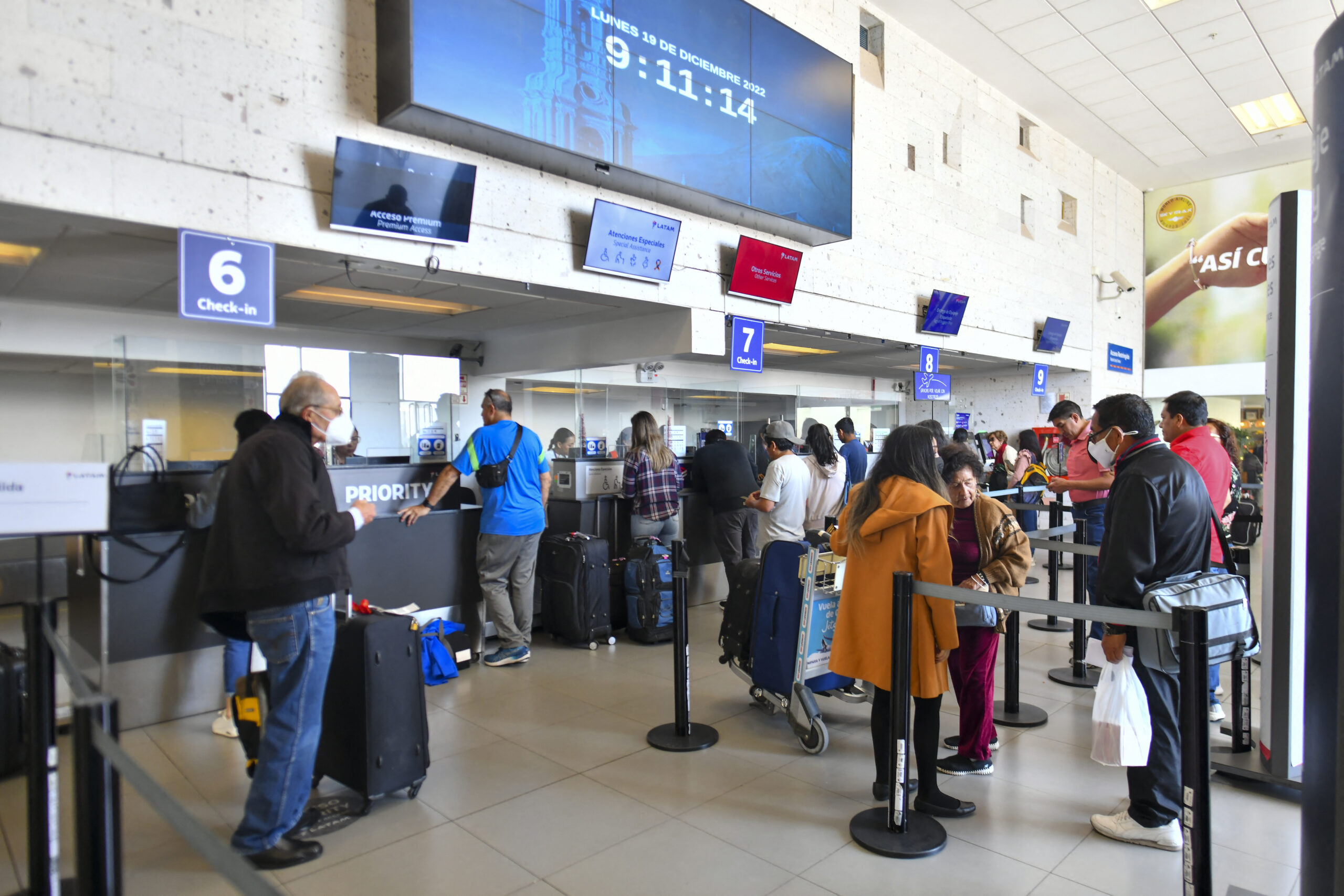
| By AFP |
The European Union added its voice Monday to calls for calm after nearly two weeks of protests prompted by the ouster of leftist ex-president Pedro Castillo.
Security officials say 21 people have died in clashes since Castillo was abruptly removed from power and arrested early this month after seeking to dissolve Congress to rule by decree.
His impeachment and detention drew criticism from leftist Latin American allies including Mexico, as well as from thousands of supporters who took to the streets to demand his release.
A subsequent security clampdown, including the deployment of armed soldiers during a state of emergency declared under Castillo’s successor Dina Boluarte, has killed several protesters.
“The EU condemns any use of violence and any excessive use of force,” the bloc said in a statement Monday.
It expressed concern about “reports that more than two dozen civilians have been killed so far, some of them by firearms, and many more injured during recent protests.”
The EU called for a “spirit of dialogue and cooperation to stop violence.”
In addition to the deaths, the repression of demonstrations has also left 646 people injured, including 290 policemen, according to the office of Peru’s human rights ombudsman.
On Sunday, the US State Department said Secretary of State Antony Blinken had spoken to Boluarte, urging the new president to pursue reforms and “focus on reconciliation.”
Castillo, a former rural school teacher and union leader, unexpectedly took power from Peru’s traditional political elite in elections last year.
He immediately came under fire, surviving two early impeachment bids, and soon also found himself in the cross-hairs of prosecutors looking into numerous graft claims.
He is the subject of six separate criminal investigations.
Castillo’s short term was plagued by instability, with three prime ministers and seven interior ministers coming and going in just over a year.
Opinion polls revealed massive public disapproval of Castillo’s management of the country, but thousands nevertheless spilled onto the streets when he was arrested.
‘Criminal organization’
By Monday, the protests appeared to be waning, with smaller groups gathered calmly in several parts of the country, waving signs denouncing Boluarte as a “killer” and demanding her resignation.
They also want elections scheduled for 2026 to be brought forward to next year — a measure that lawmakers will consider this week.
Demonstrations have shaken the country since Castillo’s impeachment on December 7, with roadblocks and airport disruptions and thousands of tourists left stranded.
Operations at the airport of Arequipa, Peru’s second busiest, resumed Monday after a week of closure due to protesters obstructing the runway with stones, sticks and burning tires.
Neighbor Chile announced, meanwhile, that a chartered plane would evacuate stranded visitors to the Inca citadel of Machu Picchu to Lima.
Castillo is being held in pre-trial detention on charges of rebellion and conspiracy.
Boluarte, who was Castillo’s vice president and took over after he was impeached, said Sunday that Mexico had offered asylum to Castillo’s graft-accused family.
Speaking on the Panorama TV program, she did not specify whether the family members — Castillo’s wife, two children and sister-in-law — have left the country.
Mexico’s President Andres Manuel Lopez Obrador and fellow leftist leaders of Bolivia, Argentina and Colombia have all expressed support for Castillo.
Prosecutors have accused Castillo’s wife, Lilia Paredes, of criminal conspiracy and money laundering as part of an alleged graft network headed by her husband.
The “criminal organization” Castillo stands accused of running is alleged to have handed out public contracts in exchange for kickbacks.
Paredes’s sister Yenifer is also accused in the alleged plot.
The country is no stranger to instability: it had three different presidents in five days in 2020, and now six presidents since 2016.
Six of Peru’s last seven presidents were investigated or prosecuted after their terms came to an end.
International
U.S. Senate Rejects Budget, Bringing Government Closer to Shutdown Amid DHS Dispute

The U.S. Senate voted on Thursday against a budget proposal in a move aimed at pressuring changes at the Department of Homeland Security (DHS), following the killing of two civilians during a deployment of immigration agents in Minneapolis.
All Senate Democrats and seven Republican lawmakers voted against the bill, which requires 60 votes to advance, pushing the country closer to a partial government shutdown that would cut funding for several agencies, including the Pentagon and the Department of Health.
The rejection came as Senate leaders and the White House continue negotiations on a separate funding package for DHS that would allow reforms to the agency. Proposed measures include banning Immigration and Customs Enforcement (ICE) agents from wearing face coverings and requiring them to use body-worn cameras during operations.
The vote took place just hours after President Donald Trump said he was “close” to reaching an agreement with Democrats and did not believe the federal government would face another shutdown, following last year’s record stoppage.
“I don’t think the Democrats want a shutdown either, so we’ll work in a bipartisan way to avoid it. Hopefully, there will be no government shutdown. We’re working on that right now,” Trump said during a Cabinet meeting at the White House.
International
Trump Says Putin Agreed to One-Week Halt in Attacks on Ukraine Amid Extreme Cold

U.S. President Donald Trump said on Thursday that he secured a commitment from Russian President Vladimir Putinto halt attacks against Ukraine for one week, citing extreme weather conditions affecting the region.
“Because of the extreme cold (…) I personally asked Putin not to attack Kyiv or other cities and towns for a week. And he agreed. He was very pleasant,” Trump said during a Cabinet meeting broadcast by the White House.
Trump acknowledged that several advisers had questioned the decision to make the call.
“A lot of people told me not to waste the call because they wouldn’t agree. And he accepted. And we’re very happy they did, because they don’t need missiles hitting their towns and cities,” the president said.
According to Trump, Ukrainian authorities reacted with surprise to the announcement but welcomed the possibility of a temporary ceasefire.
“It’s extraordinarily cold, record cold (…) They say they’ve never experienced cold like this,” he added.
Ukrainian President Volodymyr Zelensky later commented on the announcement, expressing hope that the agreement would be honored.
International
Storm Kristin Kills Five in Portugal, Leaves Nearly 500,000 Without Power

Storm Kristin, which battered Portugal with heavy rain and strong winds early Wednesday, has left at least five people dead, while nearly half a million residents remained without electricity as of Thursday, according to updated figures from authorities.
The revised death toll was confirmed to AFP by a spokesperson for the National Emergency and Civil Protection Authority (ANPEC). On Wednesday, the agency had reported four fatalities.
Meanwhile, E-Redes, the country’s electricity distribution network operator, said that around 450,000 customers were still without power, particularly in central Portugal.
Emergency services responded to approximately 1,500 incidents between midnight and 8:00 a.m. local time on Wednesday, as the storm caused widespread disruptions.
The Portuguese government described Kristin as an “extreme weather event” that inflicted significant damage across several regions of the country. At the height of the storm, as many as 850,000 households and institutions lost electricity during the early hours of Wednesday.
Several municipalities ordered the closure of schools, many of which remained shut on Thursday due to ongoing adverse conditions.
Ricardo Costa, regional deputy commander of the Leiria Fire Brigade, said residents continue to seek assistance as rainfall persists.
“Even though the rain is not extremely intense, it is causing extensive damage to homes,” he noted.
In Figueira da Foz, a coastal city in central Portugal, strong winds toppled a giant Ferris wheel, underscoring the severity of the storm.
-

 International3 days ago
International3 days agoU.S. Senate Rejects Budget, Bringing Government Closer to Shutdown Amid DHS Dispute
-

 International4 days ago
International4 days agoFootball Fan Killed in Clashes After Colombian League Match
-

 Central America4 days ago
Central America4 days agoGuatemala President Says Starlink Terminal Found Inside Prison
-

 International4 days ago
International4 days agoRubio Says U.S. Could Participate in Follow-Up Russia-Ukraine Talks
-

 International4 days ago
International4 days agoMissing Spanish Sailor Rescued After 11 Days Adrift in Mediterranean
-

 Central America2 days ago
Central America2 days agoPanama Supreme Court Strikes Down Panama Ports Concession as Unconstitutional
-

 International3 days ago
International3 days agoStorm Kristin Kills Five in Portugal, Leaves Nearly 500,000 Without Power
-

 Central America2 days ago
Central America2 days agoU.S. and Guatemala Sign Trade Deal Granting Zero Tariffs to Most Exports
-

 International3 days ago
International3 days agoMan Arrested After Vehicle Crashes Into Jewish Institution in Brooklyn
-

 International3 days ago
International3 days agoTrump Says Putin Agreed to One-Week Halt in Attacks on Ukraine Amid Extreme Cold
-

 Central America5 hours ago
Central America5 hours agoCosta Rica Goes to the Polls as Voters Choose Continuity or Change

























